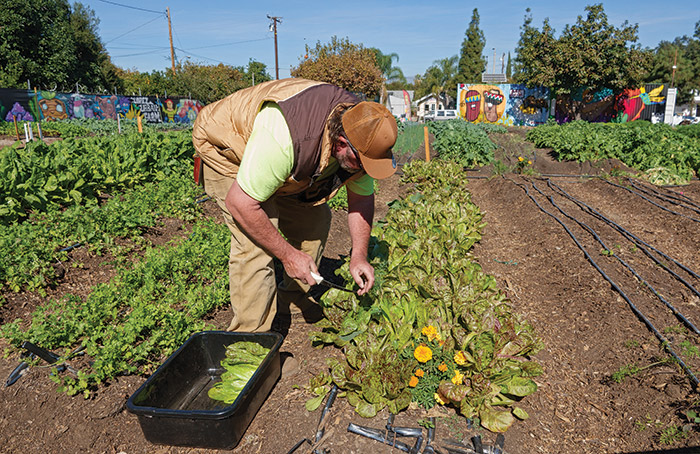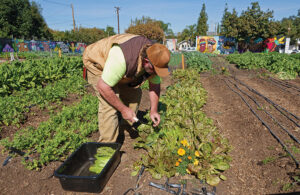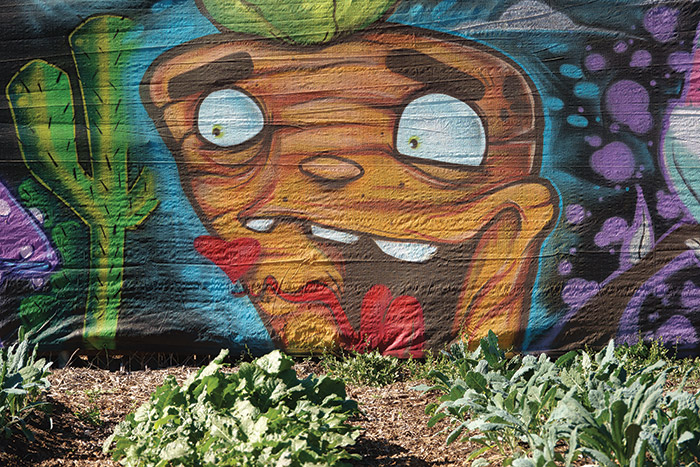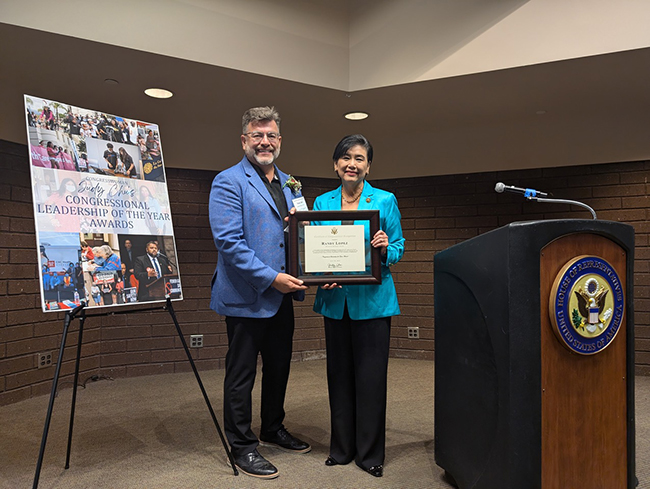Starting a conversation: urban farm aims to educate, change lives

Farmer Stephen Yorba hopes Lopez Urban Farm can educate kids about the earth, farming, and life. Courier photo/Peter Weinberger
By Lisa Butterworth
On a recent Saturday morning at Lopez Urban Farm in Pomona, a group of kids and their caregivers gathered around Stephen Yorba (better known as “farmer Stephen”), sharing their favorite insects. “Butterflies!” called one. “Bees!” yelled another. “Ladybugs! And lizards!” said an enthusiastic 6-year-old before they sat down to make butterfly feeders out of cut fruit.
The hour-and-a-half session about nature’s pollinators was part of the ongoing Junior Urban Farmers training program, just one of the many ways Lopez Urban Farm is serving the local community.
A few years ago, the three-acre farm was just a vacant lot owned by the Pomona Unified School District. Now the grounds are teeming with life — towering corn stalks, shady trees, garden boxes overflowing with herbs, rows of fall and winter vegetables, and even a pen featuring the farm’s newest addition, goats.
“Everything starts with a vision,” said Yorba, executive director of Community Partners 4 Innovation, aka CP4I, a Pomona-based nonprofit dedicated to building urban farms throughout the city, and lead farmer at Lopez Urban Farm. He’d had his sights set on this piece of land and put that vision into action about three and-a-half years ago.

Farmer Stephen Yorba hopes Lopez Urban Farm can educate kids about the earth, farming, and life. Courier photo/Peter Weinberger
“We created a proposal we pitched to Pomona Unified School District,” Yorba said. “We told them we would build them a three-acre farm and in return, we would educate the community and their kids.” On the surface that’s exactly what they’re doing. But what runs deeper are the intangible benefits — the feelings of peace the farm provides, the collective consciousness-raising, and the existence of a space for inspired communing with nature and among neighbors.
“Oftentimes in communities like this, there’s a lack of resources that are important to have in order to support a vibrant community and promote well-being,” said Yorba, who was born and raised in Pomona. “That could be anything from food security to access to education to green space, and all of those are tied to well-being.”
Growing good food is an obvious priority, and Yorba cites the health benefits of eating seasonal, locally grown produce. It’s something the farm has in abundance and provides to the community with a “pay-what-you-can, take-what-you-need” policy for people who come to the almost daily
Bodega Comunitaria hours or the weekly food bank style Evergreen Equal Access Market.
In a city with limited green space, simply having somewhere to sit under a tree or put your hands in the soil is also incredibly impactful. “As soon as you walk in off the street and come into a space like this, you feel different,” Yorba said. “It causes a reaction — a physical, mental, emotional, and psychological reaction — nurturing your whole well-being.”

Colorful murals adorn the walls surrounding Pomona’s Lopez Urban Farm. Courier photo/Peter Weinberger
Though he paints the picture of a consummate farmer now, in well-worn work pants, boots, and a flannel shirt flanked by a puffer vest, Yorba spent 25 years as a teacher before retiring to run CP4I full time, and he considers education to be one of the most crucial components of the farm’s mission. “I’ve devoted my whole life to education because I believe that education can create the world that we want to see and live in,” he said. “Minds are changed through education, viewpoints are cultivated, conversations and real change can come through education.”
It’s no coincidence that the farm’s programming is geared toward kids. In addition to the Junior Urban Farmers training program, the farm is visited weekly by a number of local elementary school classes and the hands-on curriculum imparts practical knowledge like how to turn soil, sow seeds, and harvest vegetables. But it also teaches bigger ideas, like living and eating by the seasons; self-sufficiency and sustainability; and the interconnectivity of all living beings.
Yorba knows the kids who visit won’t all grow up to become farmers, but he hopes they’ll think differently about the way they treat the planet and live in community, a slow paradigm shift that can instigate true change. “We think that it’s really, really important that we are responsible for raising the next generation of eco-conscious human beings,” he said.
The education component goes beyond farm specific lessons. On any given day bilingual yoga, art, or herbal medicine classes may be happening, and events that teach and celebrate native culture and practices are commonplace. “To be able to have access to those extracurricular activities and education is something I think that every family deserves,” Yorba said. The response, he continued, is overwhelmingly positive. “People have been inspired, and so invariably the feedback tends to be one of deep gratitude.”
His long-term vision is that Lopez Urban Farm can be a model for building these kinds of spaces throughout Pomona, which will only enhance the numerous partnerships already being nurtured. “This is a farm that’s built by the community, for the community, with the community,” Yorba said. “One of the things we do is we support and incubate community members who have a vision, an idea that intersects with our work.”
On the east side of the farm is a Southwest native garden being cultivated in conjunction with Indigeknowledge, a local group that promotes native culture, wisdom, and education. On the west side of the acreage, an Alkebulan garden is in the works, helmed by folks in the community who want to provide access to African diasporic foods representative of their culture. Another half-acre of the farm will soon be dedicated to a partnership with Just Us 4 Youth, a Pomona nonprofit mentoring local youth, supporting at-promise kids who will learn how to build and run an urban farm.
“These are the things that agriculture can do in an urban setting that you can’t do when agriculture is stuck out in the rural fringes. And it’s a demand, right? It’s our responsibility,” Yorba said. “If we’re going to bring farming into an urban community, we have to be ready to address not just food issues, but all types of social justice issues that exist. We should be a force for healing in our community.”









0 Comments